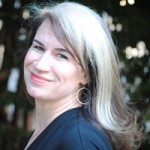“When I was very little,” Diane Muldrow says, “all my mother had to do to make me happy was read to me. Once when she was reading to me, I told her I wanted to write books when I grew up. I wrote lots of poems and stories and even a novel in elementary school. By high school, though I had other aspirations. I wanted to be a photojournalist for National Geographic.”
At Ohio University, Muldrow majored in magazine journalism and dance. As a journalism student, she learned that every word in an article has to pack a punch. As a dancer, she says, “I learned a lot about performing, choreography, and thinking [creatively].”
After graduation, Muldrow decided not to pursue a career in magazine publishing, opting instead to perform on New York City’s avant-garde stage as a dancer and as an actor in several one woman monologues, a couple of which she wrote. However, she continued to struggle with what she really wanted to do with her life. A frequent bookstore visitor, she recalls, “I was still going into the children’s section first. At least I had the presence of mind to realize I was doing that. I started to think, well, maybe that is what I should be doing.”
She landed a job as a junior editor for Golden Books where she occasionally wrote licensed books involving Disney and Barbie characters. “It was boot camp,” Muldrow says of the experience. “I really learned the nuts and bolts of picture book writing, and I gained a lot of confidence.” Although, she often wondered if she would ever write a book from an original idea that did not involve licensed characters.
Muldrow’s big break came about ten years into her editing career. “My first original book…was The Happy Book, a novelty book published by Scholastic’s Cartwheel Books, where I was working at the time…Being steeped in the industry was definitely a big factor in my writing taking off.”
In 1999, Muldrow moved back to Golden Books as an editor. At that time, she and another Golden Books editor, Bonnie Bader, developed a proposal for a series about teenage girls who like to cook. Muldrow and Bader planned to write the series together; unfortunately, Golden Books declared bankruptcy and Bader left for Grosset & Dunlap. Bader successfully pitched the cooking series to her new employer with Muldrow as the sole author, and the co-author team became an author-editor team. “It was probably the most challenging thing I’ve ever done,” Muldrow says about writing the Dish series. On September 11, 2001, the day terrorists attacked New York City and Washington, D.C., Muldrow was supposed to begin work on her four-book series; on September 12, Bader called to make sure she was hard at work. “It helped me focus,” Muldrow says, “I couldn’t dwell on things. I wrote after work and on the weekends.” Eventually, Muldrow churned out twelve Dish books in a little over a year.
Mudrow specializes in books for very young children. “I’ve gotten several ideas by watching nature documentaries,” she says. The image of the baby penguin hiding beneath its father’s feet in the documentary March of the Penguins planted the seed for Mama, Where Are You?, a lift-the-flap book about how mothers take care of their young in the wild. Mama, What’s In There? exposes preschoolers to pregnancy in animals, and the upcoming How Do Lions Say I Love You? explains how animals show affection. Muldrow carefully researches each animal fact in her books before publication. “I’m writing nonfiction for preschoolers,” she says.
We Planted A Tree will be released in the spring of 2010 and is Muldrow’s first jacketed hardcover book. “It’s my favorite because I love the writing and the ideas and how it all came together.” The title popped into Muldrow’s head many years ago, but the plot and characters remained elusive. While browsing Amazon.com to get the creative juices flowing, she stumbled across Wangari Maathai’s The Greenbelt Movement. Maathai won the 2004 Nobel Peace Prize for organizing Kenyan farmwomen in the planting of over 30 million trees. Muldrow mulled over Maathai’s work and suddenly a line of text came to her: “We had a tree and it grew up and so did we.” With that line, Muldrow knew she had a book and wrote the story in two days—after 10 years of letting the idea simmer. “I don’t think I’ll ever write anything that good again,” she says.
Muldrow gives herself permission to daydream during her one-hour subway commute from her apartment in Brooklyn to her office in Manhattan and back again. “This really helps the book ideas come,” she says. “It looks like I’m just sitting there, but actually it’s productive time for me.” From solving personal problems, to decorating her apartment, to writing books, Muldrow allows ideas to come to her rather than force them. “Maybe that’s why I’ve been so productive in the last five or six years,” she says.


